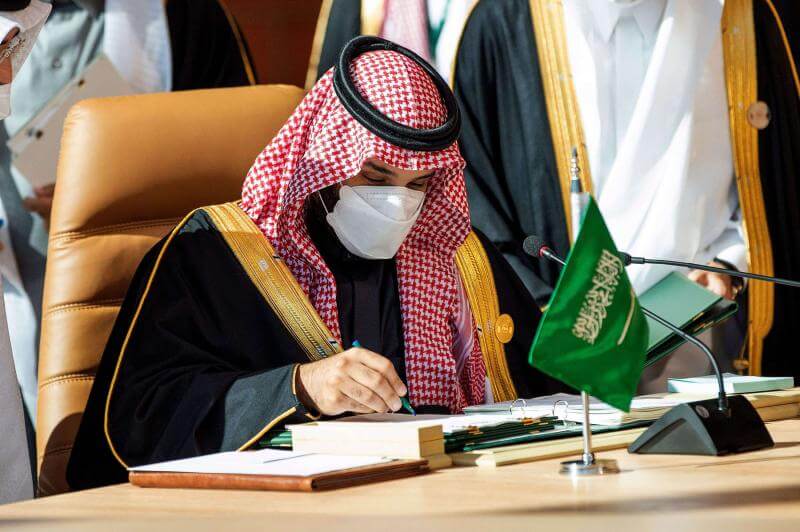On Tuesday, during the 41st Gulf Cooperation Council (GCC) summit in Al-Ula, Saudi Arabia, Gulf leaders signed a “solidarity and stability” agreement to end the three-year-long diplomatic rift between Qatar and the Saudi-led regional alliance comprising of Saudi Arabia, Egypt, United Arab Emirates, and Bahrain.
The leaders signed the Al-Ula declaration, named after the Saudi city where the summit was being hosted. The details of the deal, however, have not been released yet.
In 2017, Saudi Arabia, along with the UAE, Bahrain, and Egypt, cut ties with Qatar, accusing Doha of supporting radical Islamist groups in the region and having warm relations with Iran. Consequently, the nations imposed a land, sea, and air blockade on Qatar. The travel ban was further supported by Jordan, Maldives, Malaysia, Yemen, and the Tobruk-based government in Libya.
However, in recent months there has been a shift in Riyadh’s policy towards Qatar. With Joe Biden winning the 2020 United States election, Saudi Arabia may be taking interest in mending its relationship with Qatar in the hopes that Biden will, in turn, soften his foreign policy approach towards the Kingdom.
Saudi Arabian crown prince Mohammed bin Salman on Tuesday thanked the United States (US) and Kuwait’s for their mediation in the process, saying, “These efforts helped us reach the agreement of the Al-Ula statement that will be signed at this summit, where we affirm our Gulf, Arab and Islamic solidarity and stability….There is a desperate need today to unite our efforts to promote our region and to confront challenges that surround us, especially the threats posed by the Iranian regime’s nuclear and ballistic missile programme and its plans for sabotage and destruction.”
Sheikh Mohammed bin Rashid Al Maktoum—who is the Vice President and Prime Minister of the United Arab Emirates (UAE), and the ruler of the Emirate of Dubai—also expressed his approval of the agreement, tweeting: “A positive summit unifying ranks and establishing fraternity… changes and challenges surrounding us require genuine Gulf strength, cohesion and cooperation as well as Arab depth and stability.”
شاركت اليوم في قمة العلا لقادة دول مجلس التعاون..قمة إيجابية.. موحدة للصف..مرسخة للإخوة برعاية أخي خادم الحرمين الشريفين وولي عهده الأمير محمد بن سلمان ..المتغيرات والتحديات المحيطة بنا تتطلب قوة وتماسك وتعاون خليجي حقيقي وعمق عربي مستقر . pic.twitter.com/axndY13uNu
— HH Sheikh Mohammed (@HHShkMohd) January 5, 2021
Along with the signing of ‘Al-Ula declaration,’ Egypt—which is not a member of the GCC, but attended this summit—also signed a reconciliation deal with Qatar,following Riyadh’s decision to reopen its borders and airspace to Doha.
The Egyptian Foreign Ministry said, “Egypt appreciates every sincere effort made to achieve reconciliation between the Arab quartet countries [Saudi Arabia, Egypt, United Arab Emirates and Bahrain] and Qatar.”
The development was also welcomed by Turkey’s Foreign Minister, Mevlüt Çavuşoğlu, who said, “This step constitutes a very important step in solving the conflict ongoing since June 2017," the ministry said in a statement, after it was announced that Saudi Arabia would lift a years long embargo on Qatar, opening its air, land and sea borders in the first steps toward ending the Gulf crisis…The mediation efforts of international actors, led by Kuwait, to make sure this step is taken are praiseworthy.”
The GCC was first set up in 1981 as a political and economic confederation of six states, all headed by monarchies, that make up the Arabian Peninsula, minus Iraq and Yemen. Since then the six members met each year to discuss economic, security, cultural, and social cooperation, and other regional issues. The presidency of the GCC rotates annually. Additionally, the council has its own military army, Peninsula Shield Force, based in Saudi Arabia.
The 41st GCC summit was originally scheduled for December but was postponed as no agreement was reached between Qatar and the Saudi-led alliance. However, the foreign ministers of the Gulf Arab states held a virtual conference ahead of the summit and successfully paved a way for the “solidarity and stability” deal signed during the meet.

